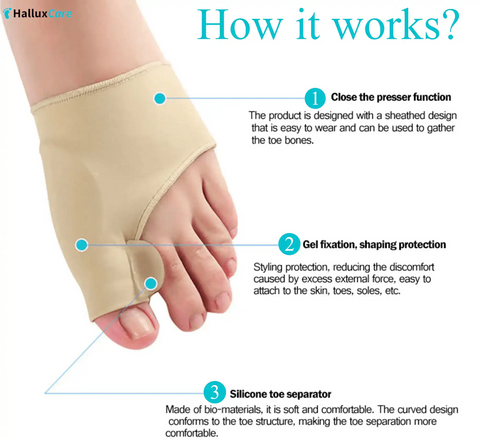Should You Delay Bunion Surgery? Insights from Real Experiences
Last Updated: January 5th 2025
Author: Dr. Emily Carter, DPM, Board-Certified Podiatrist
Bunion surgery, or bunionectomy, can be a life-changing procedure for those suffering from severe pain and discomfort. However, as with any surgical intervention, timing is critical, and the decision to proceed should be made carefully. A recent Reddit comment sheds light on the potential downsides of undergoing bunion surgery prematurely and highlights some lesser-discussed risks.
In this article, we’ll explore everything you need to know about bunion surgery, non-surgical alternatives, and the pros and cons of waiting. Our goal is to arm you with evidence-based information so you can make the best decision for your health.
Understanding the Dilemma: When Is Bunion Surgery Necessary?
Bunions, or hallux valgus, are bony protrusions that form at the base of the big toe, often leading to pain, swelling, and restricted mobility. According to the American Orthopaedic Foot & Ankle Society (AOFAS), surgery is typically recommended only when conservative treatments fail, and the pain significantly impacts daily life.
Key Insights from Real Experiences
A Reddit user shared their experience of undergoing bunion surgery prematurely. Their story highlights several risks and considerations:
- Avoid Premature Surgery: The individual underwent surgery before the pain became unbearable, resulting in complications such as prolonged recovery (six months in a boot) and the possibility of needing a second, more invasive surgery.
- Fusion Risks: Improper bone fusion is a common postoperative complication. According to a study published in the Journal of Foot and Ankle Surgery, fusion failure can occur in up to 10% of cases, leading to additional surgeries.
- Irreversible Changes: Even with successful correction, some patients report that their foot never feels or functions the same, a sentiment echoed by the Reddit commenter.
When to Consider Surgery
Medical experts, including the Mayo Clinic, suggest that surgery should be considered only when:
- Pain is severe and limits daily activities (e.g., walking or standing).
- Non-surgical treatments, such as orthotics or physical therapy, have failed.
- The bunion is progressively worsening and causing deformities in adjacent toes.
If your bunion does not meet these criteria, delaying surgery might be the best option.
Non-Surgical Alternatives to Explore
Before committing to surgery, there are several effective non-invasive treatments to consider. These options aim to manage pain, reduce inflammation, and slow the progression of bunions:
1. Orthopedic Bunion Sleeves
Medical-grade bunion sleeves provide immediate relief by reducing pressure on the joint and keeping the big toe aligned.
4.9 ⭐⭐⭐⭐⭐ ( 1843 reviews )
2. Footwear Adjustments
Switch to shoes with a wide toe box and soft, cushioned soles. Avoid high heels and narrow shoes that exacerbate bunion pain.
3. Toe Separators
Toe spacers or separators can help realign your toes, reduce pressure, and prevent further deformities.
4. Physical Therapy
Exercises that strengthen foot muscles and improve joint mobility can alleviate pain and slow bunion progression. A podiatrist or physical therapist can create a customized exercise plan.
5. Pain Management
Over-the-counter anti-inflammatory medications (e.g., ibuprofen) or topical treatments like castor oil can help soothe pain and swelling.
The Pros and Cons of Waiting for Surgery
Pros
- Avoid Unnecessary Risks: Delaying surgery minimizes the risk of complications such as improper bone fusion or nerve damage.
- Preserve Foot Functionality: Waiting allows you to maintain foot flexibility and strength for longer.
- Time to Explore Alternatives: You can try non-surgical treatments that may resolve your symptoms without the need for surgery.
Cons
- Progression of Deformity: Advanced bunions can lead to more complex surgeries or permanent deformities if left untreated.
- Increased Pain Over Time: For some individuals, delaying surgery could mean enduring chronic pain and reduced quality of life.
Key Takeaways
- Surgery is not the first line of treatment for bunions. It should only be considered when pain becomes unbearable or daily life is significantly impacted.
- Non-surgical options, such as orthopedic bunion sleeves, toe separators, and physical therapy, are effective for managing symptoms and preventing progression.
- Consulting a podiatrist or orthopedic specialist is crucial to determine the best course of action for your unique situation.
- If surgery is necessary, choosing an experienced surgeon and discussing potential risks (e.g., fusion failure) is vital to ensure the best outcome.
FAQs
1. Can bunions go away without surgery?
No, bunions are structural deformities and cannot be reversed without surgery. However, non-surgical treatments can help manage symptoms and slow progression.
2. How long is the recovery time for bunion surgery?
Recovery typically takes 6–12 weeks, depending on the type of surgery and individual healing rates. More complex surgeries may require several months of rehabilitation.
3. What are the risks of bunion surgery?
Common risks include infection, improper bone fusion, nerve damage, and continued pain or stiffness. Consulting a qualified surgeon can help minimize these risks.
4. Are there ways to prevent bunions?
Wearing proper footwear, maintaining a healthy weight, and performing foot-strengthening exercises can help reduce the risk of developing bunions.
Practical Tips for Managing Bunions
- Use orthopedic bunion sleeves for daily relief and support.
- Invest in comfortable, wide-toe box shoes to minimize pressure on the bunion.
- Incorporate toe-stretching exercises into your routine to improve flexibility.
- Apply soothing oils, such as castor oil, to reduce inflammation and pain.
Disclaimer: This article is for informational purposes only and should not be considered medical advice. Always consult a qualified healthcare provider for personalized recommendations.
Have you undergone bunion surgery or tried non-surgical treatments? Share your experience in the comments below—your story could help someone else make an informed decision!




